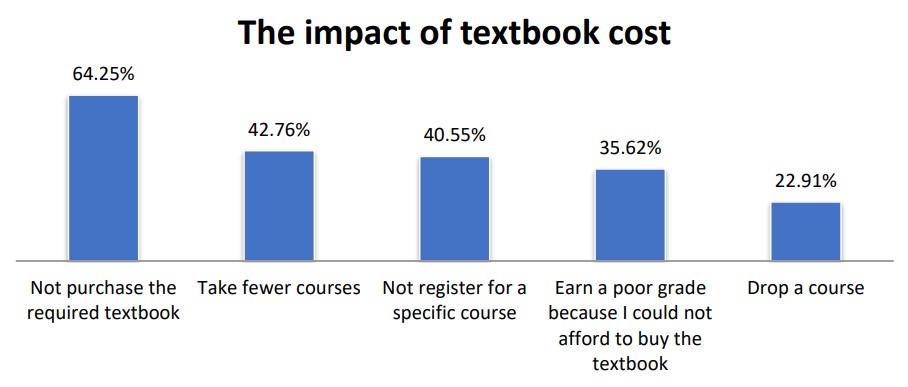The movement of transitioning from traditional textbooks to open educational resources (OER) has taken off for the past decade. This movement mostly emerged out of the fast increase in the price of textbooks (General Accountability Office 2013). High textbook prices have led to instances where students declined to purchase required academic materials and experienced a plunge in their academic performance (U.S. Public Interest Research Group 2020). As textbooks are an important part of students’ learning experience and thus performance, it is expected that issues surrounding textbooks can have an impact on student learning, comprehension, and success. In fact, the Florida Virtual Campus (FLVC) survey (2018) pinpoints five consequences of expensive textbooks, including forgoing required textbook purchases; taking fewer courses; not registering for a course; earning a poor grade; and dropping a course.

OER has increasingly become an attractive alternative for several reasons, including decreased costs and increased course material availability and thus accessibility (Watson, Domizi, and Clouser 2017; Clinton 2018). In terms of student performance while using OER content, Hardin et al. (2018) show no negative impact of OER adoption on learners’ critical thinking when compared to using standard textbooks, regardless of instructor-oriented variables. Other studies also suggest that OER has positive impacts on students, such as increase in grades and decline in Ds, Fs, and Withdrawal letter grades (Winitzky-Stephens and Pickavance 2017; Colvard, Watson, and Park 2018). Across different disciplines, existing research indicates that OER textbooks can lead to equivalent or even better outcomes when it comes to student performance, particularly in the fields of business, geography, chemistry, biology, physics, and psychology (Hilton III, Robinson, Wiley, and Ackerman 2014; Illowsky et al. 2016; Hendricks, Reinsberg, and Rieger 2017; Clinton 2018; Grissett and Huffman 2019; Chang 2020).
At the same time, faculty perception is important for OER adoption. Seaman and Seaman (2019) explored instructors’ perceptions of textbooks and reported that 61% of instructors believed that the high price of course materials posed a problem for students while only 16% adopted open-access textbooks (3, 21). At Gettysburg College, faculty were concerned about the quality of the open-access textbooks. Given the above faculty concerns, this study will add to the research on the quality and impact of OER compared to standard textbooks.